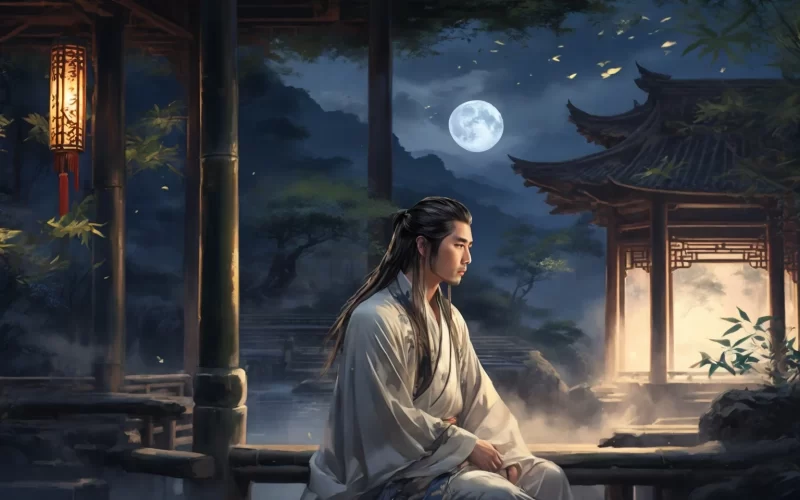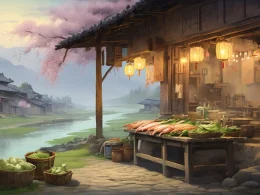Its massive height near the City of Heaven
Joins a thousand mountains to the corner of the sea.
Clouds, when I look back, close behind me,
Mists, when I enter them, are gone.
A central peak divides the wilds
And weather into many valleys.
...Needing a place to spend the night,
I call to a wood-cutter over the river.
Original Poem
「终南山」
王维
太乙近天都,连山接海隅。
白云回望合,青霭入看无。
分野中峰变,阴晴众壑殊。
欲投人处宿,隔水问樵夫。
Interpretation
Composed in 741 AD during Wang Wei's initial retreat to Zhongnan Mountains after leaving official service, this work captures both the physical majesty of these peaks and the poet's spiritual homecoming. The mountains serve simultaneously as geographic reality and metaphysical sanctuary, their grandeur mirroring Wang Wei's elevated state of mind during this transitional period.
First Couplet: "太乙近天都,连山接海隅。"
Tàiyǐ jìn tiān dū, lián shān jiē hǎi yú.
Taiyi Peak scrapes celestial courts; Ridges chain toward oceanic ports.
The hyperbolic opening frames Zhongnan's vertical and horizontal immensity. "Celestial courts" (天都) sacralizes the mountain while "oceanic ports" (海隅) suggests geographic omnipresence, establishing the poem's cosmic perspective from the outset.
Second Couplet: "白云回望合,青霭入看无。"
Báiyún huí wàng hé, qīng ǎi rù kàn wú.
White clouds seal the vista when glanced behind; Blue mists dissolve at close inspection's grind.
This perceptual paradox—clouds solidifying in retrospect while mist evaporates upon approach—demonstrates Wang Wei's mastery of shifting viewpoints. The couplet's chromatic interplay (white/blue) and kinetic verbs (seal/dissolve) create a dynamic visual experience.
Third Couplet: "分野中峰变,阴晴众壑殊。"
Fēn yě zhōng fēng biàn, yīn qíng zhòng hè shū.
Watersheds shift from central crest; Sun and shade divide each valley's breast.
The geological observation transforms into metaphysical insight—the mountain becomes microcosm, its varied exposures symbolizing life's inherent duality. The parallel structure emphasizes nature's capacity to harbor contradictions.
Fourth Couplet: "欲投人处宿,隔水问樵夫。"
Yù tóu rén chù sù, gé shuǐ wèn qiáofū.
Seeking lodging, I hail across streams— A woodcutter, lone as mountain dreams.
The unexpected human element—a woodcutter's distant figure—grounds the cosmic vision in humble reality. The watery separation (隔水) maintains the mountain's mystique while introducing human warmth.
Holistic Appreciation
Progressing from celestial heights to earthly encounter, the poem's structure mirrors a spiritual descent—from cosmological contemplation to practical need for shelter. Wang Wei's genius lies in sustaining monumental grandeur while attending to minute particulars: the clouds' behavior, light variations across valleys, and finally the woodcutter's tiny figure against the vast landscape. This interplay of macro and micro perspectives creates what later critics would call "three-dimensional poetry" (立体诗), where space becomes psychologically navigable.
Artistic Merits
The most distinctive feature of Wang Wei's poem lies in its ability to "contain boundless grandeur within compact form." With remarkable economy of expression, he captures the very essence of mountain and water landscapes. His natural yet exaggerated brushstrokes vividly portray Zhongnan Mountain's towering majesty and vast expanse, while seamlessly transitioning to depict the subtle interplay of mist, light and shadow, and mountain valleys. This creates a multidimensional composition where distance and proximity, height and depth, movement and stillness intertwine.
Moreover, the concluding lines introduce human sentiment, deftly transcending pure landscape description to infuse human warmth. This technique highlights the characteristic "Zen spirit" and "harmony between humanity and environment" that permeate Wang Wei's poetry. Through this approach, the poet achieves the remarkable feat of condensing infinite scenery into finite verse while maintaining profound spiritual resonance.
Insights
The poem models how to inhabit space contemplatively. Wang Wei doesn't merely describe mountains but demonstrates how to engage them—first through awestruck distance, then sensory immersion, finally practical interaction. His "hailing across streams" suggests that even in retreat, connection persists; that spiritual solitude needn't mean absolute isolation. In our era of environmental crisis, the work reminds us that true appreciation of nature requires multiple scales of attention—from geological timeframes to immediate human needs.
Poem translator
Kiang Kanghu
About the poet

Wang Wei (王维), 701 - 761 A.D., was a native of Yuncheng, Shanxi Province. Wang Wei was a poet of landscape and idylls. His poems of landscape and idylls, with far-reaching images and mysterious meanings, were widely loved by readers in later generations, but Wang Wei never really became a man of landscape and idylls.












